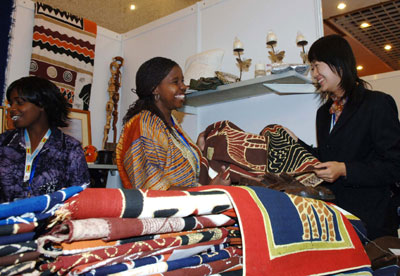When 'Made in China' become 'Made in Africa'
(Xinhua)Updated: 2006-12-23 09:55
HANGZHOU -- Some Chinese business people have transferred part of their production to Africa this year, bringing capital and jobs to local people.
Wang Jianpin, a businessman from Wenzhou, a city in east China's Zhejiang Province, shifted one fourth of the production capacity of his Hasan Shoes Co. to Nigeria in 2006. Wang has decided to invest a further six million US dollars in the western African country.
|
|
The decision followed the Beijing Summit of the Forum on China-Africa Cooperation held in November.
At the summit, Chinese President Hu Jintao pledged to take eight new measures to further improve cooperation between China and Africa. One measure involved loans of US$3 billion at particularly favorable terms, a further US$2 billion in buyer's credit and the setting up of special trading zones.
Chinese economists said the summit heralded a new age of China-Africa economic cooperation. With Chinese businessmen being encouraged to set up businesses in Africa, early movers are likely to scoop the rewards and become stable investors in the continent, they said.
The Zhejiang-based Holley Group provides anti-malaria drugs for three million malaria sufferers in Africa. Lu Chunming, president of Chongqing Holley Co., Ltd., one of the group's subsidiaries in southwestern China, said Holley is planning to launch a production facility for anti-malaria drugs in Africa. But he declined to say in which country the manufacturing entity will be located.
Emanuel Masenga, assistant to the general manager of China Paper (Tanzania) Ltd., said he now earns US$600 per month, a good salary in a country where per-capita monthly living expenses are US$30.
The Chinese papermaking company has hired 70-plus local people for its production facility in Tanzania. Technical workers earn US$100 a month. The company has a social welfare scheme for local employees. "A worker's income can support the whole family," Emanuel Masenga said.
Lou Jianguo, general manager of China Paper, said his company understands local laws and regulations and the local economic situation and has established good relations with local people.
According to Zhang Yuanxiang, general manager of China Travel Service (Kenya), the year 2006 saw the number of Chinese tourists to Africa double to over 200,000. Most of them went to Africa to search for business opportunities and Kenya was often the gateway, Zhang added.
Official statistics showed that between 2000 and 2005, trade between China and Africa increased from just under US$10 billion to nearly US$40 billion, and is likely to surpass 50 billion dollars in 2006 and hit 80 billion dollars in 2010.
China is rapidly becoming one of Africa's main sources of investment. By the end of September 2006, China had established more than 800 enterprises in the continent, involving a total investment of US$11 billion. To encourage more Chinese citizens to invest in Africa, Premier Wen Jiabao pledged that China would launch a US$5-billion China-Africa Development Fund.
Some skeptics claim that China's interest in Africa is driven by self-interest and that its closer economic and trade ties with Africa could lead to a kind of "neo-colonialism."
But the allegation has been refuted by both Chinese and African leaders.
Chinese Premier Wen Jiabao has said that "the neo-colonialist hat simply doesn't fit China."
He said that, in developing relations with Africa, the Chinese government adheres to the principles of mutual respect, equality, mutual benefit and non-interference in each other's internal affairs. Concerns about a so-called "Chinese threat" in Africa were unfounded and irresponsible.
"China has established friendship with many African countries, and is opening itself up to Africa and providing assistance. It is cooperating with African countries on an equal basis and has no desire to colonize Africa," said Zimbabwe's President Robert Mugabe.
|
||
|
||
|
|
